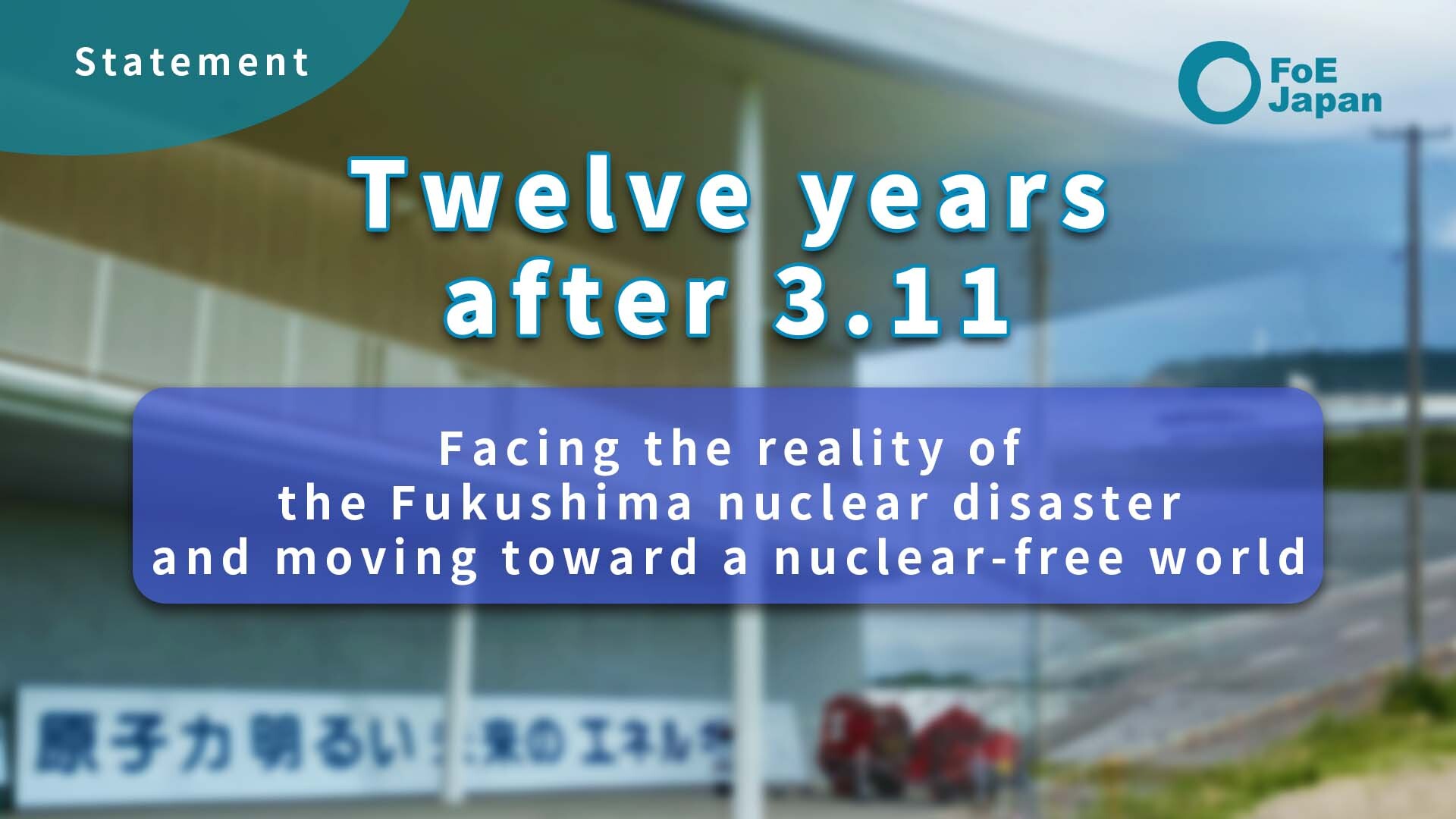[STATEMENT] Twelve years after 3.11: Facing the reality of the Fukushima nuclear disaster and moving toward a nuclear-free world

Twelve years have passed since the Great East Japan Earthquake on March 11, 2011, and the subsequent nuclear disaster at the Tokyo Electric Power Company (TEPCO) Fukushima Daiichi Nuclear Power Station.
We will never forget the shock of explosions at a nuclear power plant, despite having been told that nuclear power was safe. Radioactive material, which was supposed to have been confined by the so-called “five walls" of protection, spread widely into the environment. The nuclear accident changed the lives of many people. Many were forced to evacuate and lost their communities and livelihoods. At least 27,000 people are still evacuated. Public support, including housing, has already been cut off, leaving evacuees struggling to pay rent and living lives of isolation.
There is great controversy about the proposed discharge of “ALPS-treated contaminated water” and contaminated soil generated by the decontamination process. Both of these issues show the scale of the Fukushima Daiichi Nuclear Power Plant accident and the complexity of the problem.
People who sounded the alarm about the spread of radioactive materials have sometimes been condemned for “spreading harmful rumors,” as if they were the wrongdoers. But such a response impairs a healthy space for discourse and divides people. We must not forget that the prime responsibility for causing the nuclear accident lies with TEPCO, and with the government, for irresponsibly promoting nuclear policy. However, as with the damage caused by the accident, their responsibility is also being swept out of public view.
Regarding ALPS-treated contaminated water, the government and TEPCO have plans to start releasing it into the ocean before the summer of 2023. However, no understanding has been reached with fishermen and other stakeholders. TEPCO has not yet indicated, by nuclide, the total amount of radioactive materials remaining in the water. Preparations to discharge the contaminated water are underway, even though it is still unclear exactly what will be released, and in what quantity.
The government is trying to promote the “reuse” of contaminated soil, generated from decontamination work, in public works projects if the soil contains cesium-134 and 137 at levels below 8,000 becquerels/kg. However, this is 80 times the clearance level (which is 100 becquerel/kg for cesium-134 and 137) stipulated by the Nuclear Reactor Regulation Act for not requiring management as radioactive materials. It must also be noted that the government has a policy of not measuring radioactive materials other than cesium. Among the demonstration projects that were to be carried out in Fukushima Prefecture, the Ministry of the Environment was forced to withdraw plans due to community opposition in the Harasesaiki district of Nihonmatsu City and the Hanokura area, Odaka district of Minamisoma. Residents are also opposed to demonstration projects being planned in the Tokyo metropolitan area. It is a basic principle that radioactive materials should be managed centrally, not dispersed. We oppose the release of contaminated water into the ocean and the reuse of contaminated soil for public works.
With the Russian invasion of Ukraine that began in 2022 the world has been forced to confront the horrors of war, the dangers of nuclear power, and the fear of nuclear weapons. Once again, we express our heartfelt condolences to the victims of this war. We also call upon Russia to cease fire and withdraw immediately.
In late July 2022, the Kishida administration in Japan established the Green Transformation (GX) Implementation Council and instructed it to consider policies to revive nuclear power. In just over half a year since then, without public consultations, Cabinet approved a bill that includes the restart of nuclear power plants, the extension of the operational life of nuclear power plants, and the development and construction of “next generation innovative nuclear reactors.” This could be described as the use of the “shock doctrine," exploiting the public’s sense of crisis in the context of international energy prices that are soaring as a result of the war.
The government claims that nuclear power contributes to energy security, a stable supply of electricity, and national self-determination, in order to justify its efforts to promote nuclear. But each of these claims is wrong. Just like fossil fuels, uranium, the fuel for nuclear power, is imported, and is vulnerable to international circumstances. Nuclear plants can become targets for terrorism and war. Nuclear plants can also have many failures. From 1997 to 2010, there were 267 reports of nuclear-related accidents and failures in Japan. Nuclear power is a large-scale and centralized power source, so unplanned shutdowns can have massive impacts over wide areas, increasing the risk of tight supply and demand on the grid.
Globally, nuclear power generation costs continue to rise. The construction cost of a new nuclear plant already exceeds a trillion yen (in the range of 10 billion U.S. dollars), and nuclear is now the most expensive source of electricity. In Japan as well, costs are ballooning for reactor restart safety measures, maintenance, and decommissioning. TEPCO has spent more than a trillion yen on safety measures just for the restart of the Kashiwazaki-Kariwa nuclear plant in Niigata Prefecture.
Nuclear power is neither green nor clean. From uranium mining to fuel processing, nuclear plant operation, nuclear waste disposal, and decommissioning, the environment continues to be polluted with radioactive materials. In addition, when operating, nuclear plants continue to generate nuclear waste, which needs to be managed for tens of thousands of years, leaving a burden for future generations.
Above all, we must acknowledge that the Fukushima Daiichi nuclear disaster is not over. We must look squarely at the damage caused by the nuclear accident, seek a peaceful and sustainable society without nuclear power, and move forward in solidarity with people around the world.